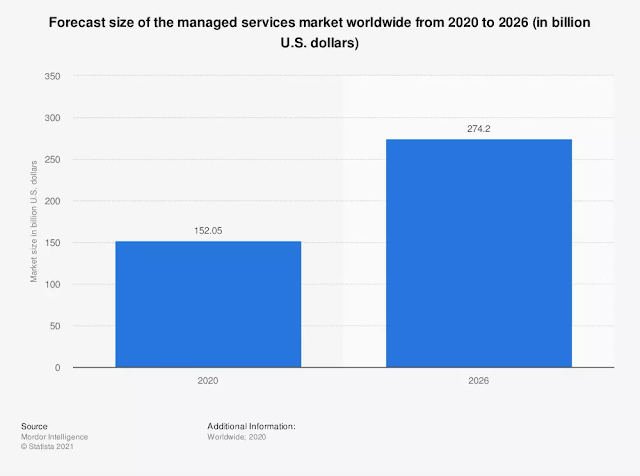Looking to boost efficiency and reduce costs in your company's IT and telecommunication management? Learn why outsourcing to a managed services provider could be the solution you've been searching for in our insightful blog post.
Managed service providers are companies that provide outsourced IT and telecommunications services to businesses. These responsibilities can be maintaining and operating networks, equipment, or other processes.
Outsourcing these tasks to a managed service provider has become increasingly popular over the years because it can save businesses time, money, and headache.
Some of the most common outsourcing needs for managed service providers include cloud computing, networking equipment/services, cybersecurity, disaster recovery solutions--the list goes on!
In this blog post, you'll explore some of the reasons why you should outsource your IT and telecommunication processes to a managed service provider.
01Who is Managed Service Providers?
Managed service providers are companies that provide outsourced IT and telecommunications services to businesses.
Companies who buy managed services believe that managed service providers can maintain and operate IT or Telecommunication infrastructure with a high level of skill and expertise.
The company can focus on other parts of their business while the managed services providers take care of IT and telecommunications infrastructure.
However, there are several reasons why companies buy managed services from a dedicated provider rather than an in-house department or an external one.
Key benefits of outsourced partner are: Access to advanced hardware, software updates & upgrades on time thus ensuring high availability of Essential expertise for the most complex and critical infrastructure.
The company has many benefits from the managed services provider, such as:
- The reduced total cost of ownership (TCO)
- Lessens the burden on in-house staff and resources
- Flexibility to scale up or down quickly as business needs change
- Scalability - companies can add or remove services as their needs change. For example, if a company experiences a sudden increase in marketing, it may need more bandwidth. However, as soon as the campaign is over they can remove that service without going through a lengthy setup process
- Outsourcing IT and telecommunications to a managed service provider will make your job easier. You won't have to worry about hiring an entirely new staff of technicians or sourcing needed parts. If you're considering outsourcing your company's IT and telecommunication networks, consider developing a list of questions that you'd like to ask potential managed services providers. The more research you do into each provider, the better prepared you will be when it comes time to pick a partner for managed services.
Save your time, money, and solve problems.
There are several reasons why companies outsource the maintenance and operation of their IT and telecommunications infrastructure to a managed services provider. The main benefits of doing so are that it can save the company time, money, and problems.
Managed service providers are experts in maintaining and operating IT and telecommunications infrastructure. This means that the company can focus on their business and leave the management of these systems to the provider.
This reduces costs, as the company does not need to hire or train employees to manage these systems. In addition, the managed services provider will be up-to-date on all the latest updates and upgrades to hardware and software, which ensures that the company's systems are running smoothly.
If there is ever any problem with the IT or telecommunications infrastructure, the managed services provider will be on hand to respond immediately. This service is essential to ensure that businesses can continue to run smoothly and does not affect their operations.
There are several reasons why companies choose an outsourced partner rather than an in-house department or an external one.
Some of these benefits include access to advanced hardware, software updates & upgrades on time thus ensuring high availability, essential expertise for the most complex and critical infrastructure.
Managed services providers can meet the needs of businesses by offering different services. They can provide single bundled solutions or combine several of them.
In the telecommunication industry, big vendors such as Huawei, Ericsson to Nokia, provide Managed Services to Mobile Network Operators worldwide.
The MNOs can continue to focus on their core business while outsourcing the management of telecommunication infrastructure, including fixed-line, mobile networks, data center operations, and security.
In the IT industry, some vendors in the Managed Services Provider business are IBM, HP, Oracle, etc.
The managed services providers are experts in managing these services. They have the expertise to solve any issues that may arise with your telecommunications or IT infrastructure.
The MNOs do not have to have their own employees on hand to solve these issues, instead, they can turn to the managed services provider for help.
Market prediction of managed services provider to 2026 as follows:
Types of managed services providers can offer to businesses
There are several types of managed service providers that businesses can choose from. The most common type is the full-service provider.
This provider offers a wide range of services, such as network management, system security, data center operations, and help desk support. They are able to meet the needs of businesses by providing a single bundled solution or combining several services.
Another type of provider is the specialist provider. This type of provider focuses on a specific service, such as cloud computing or networking equipment/services. They have the expertise in this one area and are able to offer solutions that meet the specific needs of businesses.
The final type of provider is the niche player. This provider specializes in a particular or industry, such as healthcare or finance. Their services are designed to meet the needs of other companies in this type of industry, which can include anything from helping them maintain compliance to providing disaster recovery services.
Businesses choose managed services providers for several reasons. The main reason is that they specialize in providing IT and telecommunication infrastructure management solutions to businesses.
While you may need to hire your own employees to manage these systems in-house, it can be costly and time-consuming. In addition, the managed services provider will have the latest updates and upgrades to hardware and software, which ensures that your systems are running smoothly.
If there is ever any problem with the IT or telecommunications infrastructure, the managed services provider will be on hand to respond immediately. This service is essential to ensure that businesses can continue to run smoothly and does not affect their operations.
Some Service Level Agreement (SLA) should be achieved by the Managed Services Providers. This means that they need to be able to provide a certain level of service that is agreed upon by both parties.
The SLAs will outline the specific services that the provider will offer, as well as what they are responsible for and what the customer is responsible for.
Choosing a managed services provider can be overwhelming, but by doing your research and knowing what to look for, you can find the right provider for your business.
By outsourcing your IT and telecommunication infrastructure to a managed services provider, you can ensure that your systems are running smoothly and that you are meeting your business goals.
SLA in Managed Services Business
The managed services provider agrees to provide the customer with the following services:
System Security
The managed services provider agrees to provide the customer with system security. This includes protection from viruses, malware, and other attacks that could harm the network or data. In addition, the provider will ensure that the system is updated with the latest security patches to protect against any new threats.
System security is an essential service that managed services providers need to be able to offer to businesses. They will need to ensure that the system is protected from viruses, malware, and other attacks that could harm it or the data.
In addition, they will need to make sure that the system is updated with the latest security patches to protect against any new threats. The provider should also be able to respond immediately if a problem arises with the system.
Two parameters one can use to measure a managed services provider's performance in system security are response time and technical support hours.
If there has been a breach in the system, for example, how long does it take them to respond? Are they on call 24/7? The customer should also be able to gauge their satisfaction with the technical support provided.
How helpful is it? Do they provide documentation and training for you and your staff if needed? This way, if there is a problem with the system, you will be able to get it resolved quickly and without too much trouble.
Examples of Response Time:
- During regular business hours, response time should be within 1 hour.
- During non-regular business hours, response time should be within 2 hours.
Examples of Technical Support Hours:
- 24/7 technical support is available for customers that have signed an SLA.
- The managed services provider agrees to provide the customer with system monitoring.
The managed services provider agrees to monitor the customer's system for any potential problems or issues. They will be responsible for detecting any breaches in security, hardware failures, and software glitches. In addition, they will be responsible for the maintenance and upkeep of the system.
Global market size for managed services provider in system security is as follows:
The Managed Services Provider will be responsible for providing customers with regular reports regarding their network performance, such as availability, latency, packet loss, and jitter. They will also be responsible for any necessary changes or upgrades to the network in order to maintain optimal performance.
Maintenance
A managed services provider may conduct a variety of maintenance tasks in a given year, some of which are more common than others. It is important to understand what these tasks entail and why they are necessary for the upkeep of the network.
Common Tasks:
- Hardware Repair or Replacement
- Software Installation or Update
- Backup Maintenance
Uncommon Tasks:
- Network Maintenance
- Monitoring
The scope of work performed by a managed services system provider team on a day-to-day basis may include maintenance tasks such as hardware repair or replacement, software installation or update, backup maintenance, network maintenance, and monitoring.
The provider should be able to respond immediately if a problem arises with the system.
Network Management
Network management, as the concept relates to the operation of a managed services provider, is an essential service that certain providers need to be able to offer.
This includes things like monitoring for potential problems or issues with the system and conducting necessary changes or upgrades in order to maintain optimal performance.
Network management can include things like monitoring for potential problems or issues with the system, conducting necessary changes or upgrades to maintain optimal performance, managing bandwidth and traffic, and ensuring compliance with regulations.
Data Center Operations
Maintaining a data center can be a daunting task, but it is one that a managed services provider can be more than capable of handling.
They will have the experience and expertise necessary to keep your data center running smoothly and efficiently. In order to do this, they will need to have a good understanding of your business and the needs of your customers.
They will also need to have a robust network monitoring system in place so that they can detect any potential problems or issues with the system.
And if something does happen, they need to be able to respond immediately so that the downtime is minimized.
In addition, they will need to make sure that the system is updated with the latest security patches to protect against any new threats that may arise.
Help Desk Support
Help Desk support is an important part of any managed services provider relationship. The help desk should be staffed with qualified technicians who can help resolve any issues that may arise with the system.
The help desk should be available 24/7 to provide support to customers who have signed an SLA. In addition, the help desk should be able to provide support for a variety of issues, such as hardware failures, software glitches, and network outages.
The help desk should also be able to provide support for a variety of platforms, such as Windows, Mac, and Linux. And they should be able to provide support in a variety of languages, such as English, Spanish, and French.
Communications have a vital role in any organization. They are the means by which information is shared between employees, and they play a critical role in the overall success of the business.
There are a variety of communications tools to improve communication within the organization in managing the managed services provider. These tools include things like email, instant messaging, video conferencing, and telephony.
Each of these tools has its own strengths and weaknesses, and it is important to select the right tool for the job.
An email is a great tool for communicating with employees and MSP teams who are located in different parts of the world. It is fast, efficient, and can be used to send both text and multimedia files.
Instant messaging is a great tool for communicating with employees who are located in different parts of the world. It is fast, efficient, and can be used to send both text and multimedia files.
Video conferencing is a great tool for communicating with employees who are not in the same part of the world. There are a variety of services that a managed services provider can provide to make remote video conferencing easy.
Telephony is a great tool for communicating with employees who are located in the same building as you. It is fast, efficient, and can be used to send both text and multimedia files.
Both parties should agree on which communication tools will be used and how they will be used. Having a clear understanding of the communication tools that will be used will help to ensure that the organization is able to communicate effectively with the managed services provider.
CONCLUSION
It can be difficult to manage IT and telecommunications processes for your company. Outsourcing these services to a managed service provider will help you keep up with the latest technology without having to worry about how it all works.
Not only do they have the experience necessary, but they also have the expertise in data center operations, help desk support, communications tools, and more.
They are able to provide regular reports on network performance so that there is always transparency between both parties.
Outsourcing IT and telecom operations to a managed services provider may be one less thing your firm has to worry about while still obtaining the best results.
Having a clear understanding of the communication tools you're using can be difficult, but outsourcing this responsibility to a managed services provider will help you get the most out of your technology. Not only will they have the expertise in communications tools, but they'll also be able to provide regular reports on how well these devices are working for your firm.
As any firm grows, its IT and telecommunications need to grow with it. Outsourcing these processes to a managed service provider will ensure that all of your company's systems are up-to-date and working smoothly.
Having the expertise in data center operations, help desk support, and more will drastically cut down on the amount of work you have to do.





